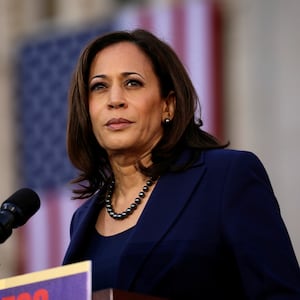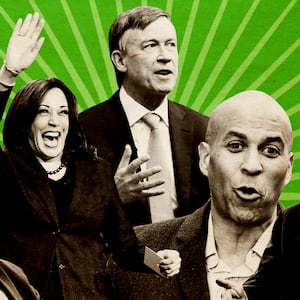During a nearly 45-minute conversation in February, Sen. Kamala Harris (D-CA) told talk-show host Charlamagne tha God that she’d been listening to Cardi B recently.
It would have been a throwaway line in most other interviews, but Charlamagne, born Lenard Larry McKelvey, has different names in his phone than the average MSNBC or CNN host.
He knew the first person he needed to text when the interview was done.
“When Kamala talked about Cardi B, I sent Cardi the clip just to let her know, ‘Hey, there are presidential candidates out here, you’re on their radar,’” Charlamagne told The Daily Beast. “She was like ‘Oh that’s dope.’”
Few radio personalities keep up relationships with both presidential candidates and the most prominent hip-hop stars. But that has emerged as part of the job for the hosts of The Breakfast Club, the hip-hop morning show on New York’s Power 105.1 that has become as important a stop for politicians as it has for rappers and celebrities.
Long a staple of morning talk radio since its 2010 debut, the show has morphed into a must-stop for Democratic political aspirants.
Dubbed “The World’s Most Dangerous Morning Show,” Charlamagne tha God and his co-hosts DJ Envy and Angela Yee conduct lengthy interviews with politicians in which the cultural weight of the show and the informality of its interviews often force media-trained presidential hopefuls to let down their guard and get more personal.
Just this year, Sen. Cory Booker (D-NJ) made news when he revealed that he has a “boo” and talked about regulating pharmaceutical companies. That was on The Breakfast Club. Similarly, on that show, Harris reminisced about smoking marijuana and stirred a brief, online controversy about what rap music she listened to while doing it. And Sen. Bernie Sanders (I-VT) appeared on the show, discussing voter suppression and reparations for the descendants of slaves.
It’s unsurprising why the show, which is most well-known for its humorous chatter and wild interviews with hip-hop stars, has become a major part of the Democratic campaign media circuit.
For one thing, the show has national reach: It’s syndicated in a total of 90 markets, Charlamagne’s manager said. And the hosts have been smart about leveraging social media to find audiences who don’t listen to terrestrial radio. The Breakfast Club films every major interview and posts them to its YouTube channel, which has more than 3.4 million subscribers. The 2020 candidate interviews have already garnered hundreds of thousands of YouTube hits each.
Most importantly, the show provides a platform for candidates to reach diverse young audiences. Sixty percent of the show’s daily audience is African-American, and the show’s hosts feel that their background allows them to ask questions that many mainstream political journalists and cable-news hosts couldn’t ask—or wouldn’t ever think to. When discussing politics, The Breakfast Club focuses heavily on issues affecting people of color.
“When you’re a black person and you’re in hip-hop culture there’s certain stuff that you can discuss in an authentic way,” Charlamagne said. “None of these other personalities can ask Kamala Harris about her blackness, you’d get crucified for that.”

Plenty more of the 2020 candidates are likely to come through the Power 105.1 studio soon.
South Bend Mayor Pete Buttigieg, the youngest candidate currently in the presidential contest, will stop by the show in the coming weeks, The Daily Beast has learned. Last Friday, Andrew Yang, a longshot entrepreneur running on universal basic income, also sat down with The Breakfast Club and made a surprisingly good impression. (They even nearly scored an interview with Roger Stone, but his recent indictment scuttled those plans).
Other presidential candidates who have yet to receive the invitation are keeping an open mind about the prospects.
“No invite as of yet but would entertain the offer if offered,” said Jamal Raad, spokesperson for Gov. Jay Inslee (D-WA). His campaign recently sent out a release to reporters with a link to Inslee’s interview with Mustafa Santiago Ali on Hip Hop Caucus’ Think 100% podcast.
Politicians and operatives alike have come to view the program’s influence as an extension of the new rules of the road in politics, where voters are no longer exclusively reached via more traditional means like televised town halls or sit-down interviews on, say, a primetime MSNBC show.
“I’m really glad to see that The Breakfast Club is seen as a must-stop for presidential candidates,” Nina Turner, a former Ohio state senator and current Sanders campaign co-chair, told The Daily Beast. “On a deeper level, it does give the opportunity for these candidates to touch multiple generations really at one time that may not be watching mainstream media.”
Turner has been a guest on the show before and Sanders appeared at least twice during the 2016 presidential campaign. Charlamagne also spoke about mental health issues on Sanders’ Facebook page and, in 2016, he hosted a Harlem event featuring the senator, civil rights activist and singer Harry Belafonte, and Erica Garner, the late daughter of Eric Garner, who was killed by an NYPD officer’s chokehold.
According to Turner, Grammy-winning rapper and Sanders supporter Killer Mike introduced the 77-year-old senator to Charlamagne, and the two have since shared a kinship. “There’s a chemistry between him and Charlamagne in particular,” Turner said. Charlamagne said Sanders called him in the months before deciding to seek another presidential bid.
Over the past several years, more and more Democratic politicians have recognized the value of appearing on The Breakfast Club. The lengthy interviews—many of which run almost an hour—give the candidates plenty of time to address issues facing communities of color, deliver talking points, as well as explore the nuance and context behind complicated issues.
Hillary Clinton, the last Democratic presidential nominee, helped set the trend with an appearance in April 2016.
Getting her on the show was no easy task, according to Bakari Sellers, a Clinton ally and former member of the South Carolina House of Representatives, who has known Charlamagne for years. After all, before her appearance, Charlamagne had accused her of “pandering to black people.” Charlamagne said the campaign vetted his background, and were made aware that he wore a Clinton mask one Halloween.
“People were just cautious of sitting her down in that environment,” Sellers told The Daily Beast. “It’s not the Tom Brokaw, Walter Cronkite type of questioning.”
Having appeared on the show in 2014 when he ran for lieutenant governor of South Carolina, Sellers cajoled the campaign into having Clinton make an appearance. Now he counts it among the best decisions the 2016 campaign made.
“It’s the 21st century Arsenio Hall, I guess,” he said of The Breakfast Club, referring to the comedian’s late-night talk show that, in June 1992, famously featured then-candidate Bill Clinton playing the saxophone in sunglasses.
Due to the free-flowing nature of The Breakfast Club’s questioning, there is real risk involved for candidates who are more staid in their manner, or are ill-prepared to have such a loose dialogue. Political aides put a lot of trust in their candidates to handle The Breakfast Club’s style, but it all comes down to whether the politician can effectively communicate their message without causing trouble for themselves.
“People can always fuck up but they can fuck up on any show,” an adviser to one prominent Democrat told The Daily Beast.
As their gatekeeping role has grown stronger, the show’s hosts have forged strong relationships with high-profile Democrats in media circles.
Charlamagne said he often bounces ideas off former senior Clinton policy adviser Maya Harris—who now works for her sister Kamala’s campaign—and CNN commentators like Sellers and Angela Rye. He’s also in group chats with high-profile black media stars like MSNBC host Joy Ann Reid, White House reporter April Ryan, and cable pundit Roland Martin where they share ideas and talk politics.
Filmmaker and actor Tyler Perry is also a big fan of The Breakfast Club political interviews. Charlamagne told The Daily Beast that the director frequently texts him to give feedback on the conversations.
While acknowledging the potential to reach new and valuable audiences, some Democratic political operatives have remained slightly wary of the show.
One woman accused Charlamagne of rape almost two decades ago. The case was resolved after he pleaded guilty to “contributing to the delinquency of a minor.” (The judge dismissed all other charges against him and he served probation. Later on, a South Carolina forensics report was released showing “no semen identified” from swabs of the accuser.)
Charlamagne’s also faced criticism for making homophobic comments and failing to intervene when one guest made transphobic comments.
Charlamagne said he understood why some politicians could be hesitant to appear on the show given his history and some of his past comments (he reiterated his denial of the rape allegations).
“Take a page out of my book and be real, because everybody got a past,” he said. “Everybody has said some effed-up things. I’m 41 years old, I’ve been doing media for 20 years. You grow, you evolve, my views on certain things weren’t the same 10 years ago, weren’t the same 15 years ago.”
The hosts don’t pretend to be unbiased in their political leanings or their candidate preferences.
Charlamagne and Yee—who both voted for Clinton in the 2016 Democratic primary and general election—said they were impressed by Harris and Yang following their appearances on the show. Yee said she liked Booker less after the interview because, unlike other candidates, he had his back to her and addressed Charlamagne for most of the conversation.
As the show has gained more traction, Charlamagne said part of the reason they’ve succeeded in booking more political guests is that the hosts have become more informed and engaged with political issues.
“In the past few years, I’ve done a lot more research, I’ve taken in a lot more information, and therapy helps a lot,” he said. “I’ve gotten to know myself better, I have a little more empathy than I used to have.”
Yee told The Daily Beast one of the strengths of the show is how candidates try to fit in with the vibe and with the hosts themselves, who are unafraid to pepper the candidates with cultural references that if they don’t know, they should.
“When candidates come up here, they try to be more hip and cool. Sometimes it just seems forced and a little weird—I don’t know that it bothers me as much as I think it’s hilarious,” she said.
“They’re a little flustered, cause it’s not what they’re used to. This is not something that was previously a stop, but now everybody feels like they have to come here.”










